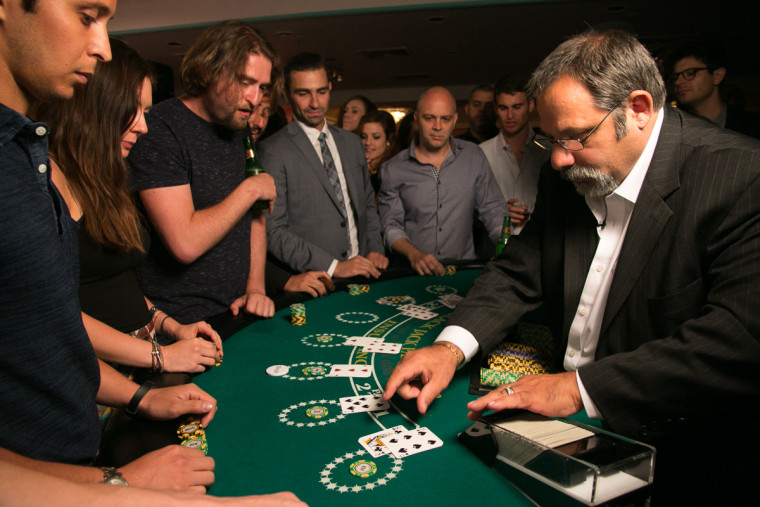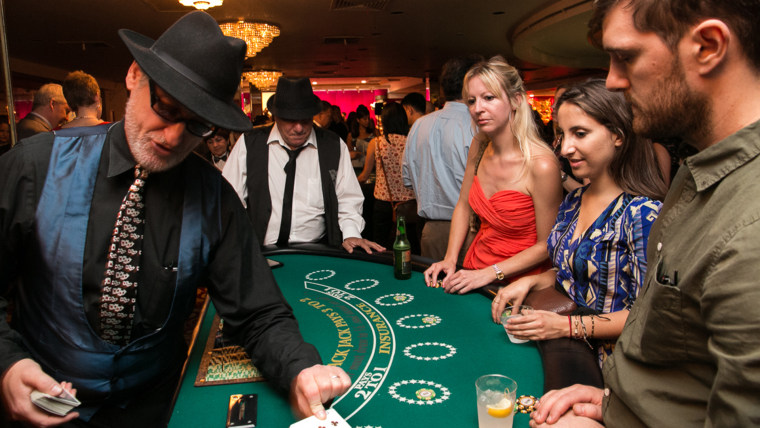They say that cheaters never prosper. And yet forms of deception are a regular part of daily life, whether it’s students cheating in online classes to phone scams to the massive Ashley Madison data leak.
And perhaps nobody knows this better than people in the gambling industry.
“If you ever hear the word ‘con’ games, that comes from the word confidence,” Sal Piacente, a casino consultant who has worked in the gambling industry for 30 years, told TODAY.com. “You're always building up someone's confidence before you rob them.” Piacente, who is also a memory expert, advises casinos on the latest scams, and how to spot cheaters — whether they’re players or staff.

Rick Blaine, a professional card counter who has played with some of the team featured in the film “21” and the book “Bringing Down the House,” agrees. “You're putting on an act,” he said. “You're not nervous.” Blaine — a pseudonym taken from Humphrey Bogart’s character in the film “Casablanca” — currently holds the title of “World’s Best Blackjack Player” after winning the annual Blackjack Ball tournament this past January.
RELATED: Man to donate $14-million Vegas winnings to charity
Perhaps it’s no coincidence that both men — who are friends despite working on opposite sides of the casino table — grew up in Brooklyn, New York. They say their street smarts have helped them in their craft. In fact, Piacente’s first encounter with gambling came at the age of 13, when his father taught him the “three-card monte” scam as a warning. Instead, the young Piacente took the trick to the schoolyard, sparking a lifetime fascination with sleight of hand and card tricks.
The pair recently joined forces for an event last week, on a night when cheating was not only encouraged, but rewarded. A crowd of about 350 people gathered in a makeshift casino — normally a dim-sum restaurant by day — in Manhattan’s Chinatown neighborhood for a Rat Pack-themed event called “The Art of Cheating,” hosted by the Obscura Society, the events arm of Atlas Obscura, a site dedicated to exploring curiosities and hidden spots.

Piacente and Blaine shared tips with TODAY that apply not only to cards, but also to real life — both for spotting cheating, and how to use the art of deception in situations like negotiating.
- Trust your gut. “If someone is being too smiley, friendly, out of nowhere, it raises a red flag,” said Blaine. The more time you spend in casinos, the more you can develop that instinct. “If someone comes up to table and starts betting big out of nowhere, I’m thinking that person might be watching the game.”
You can’t cheat an honest man. Most scams work off greed, as indicated by W.C. Fields’ 1939 film of the same name. And, it turns out, not a lot has changed in the art of cheating over the years. “All the scams are the same as they were back then,” said Piacente, who sometimes demonstrates the three-card monte hustle. In doing so, he said that people who claim they’d never bet are often the first ones taking out their money. “When someone promises you something, trust me, if its for nothing, there's something going on.”
Understand body language — to a point. Piacente says there are basic indicators that amateurs might signal if they’re lying. For example, if the person looks up, it's generally understood to mean she's thinking, but if she looks down, it’s a lie. But nothing’s fool-proof. “The professional cheats are going to understand that behavior and use it to their advantage,” he said.
And when the tables are turned, here’s how to keep your cards close:
Give yourself time to think before making a decision. "You never want to jump the gun,” said Piacente. “Always sit back and evaluate the situation.” He said that he and his wife have a pact to not make a big decision until they sleep on it. “You go to a car salesman, everybody's going to promise you everything,” he said. “Then you go home and think about it and you realize, wait a minute, it's not really what it seems.”
Pick situations where you can maximize your odds. They say the house always wins, but there’s a reason why so many professional gamblers choose blackjack. The basic premise of card counting — which is legal — involves assigning different values to cards in the deck. For example, there are only four aces in a single deck, so if all of those cards are dealt in the first round, your chances of winning decreases. Card counters like Blaine keep track of which cards are exhausted, and bet accordingly. Meanwhile, games like roulette and craps have outcomes that aren’t based on previous decisions. “If you have an honest pair of dice, you could roll a seven 10 times in a row and the odds of you rolling another seven after that are still the same,” said Blaine.
Blend in. “Look like you belong,” said Blaine, who cites the young MIT team from “21” — betting $1,000-chips — wearing cheap shoes and bad haircuts, and thereby calling attention to themselves.
Don’t be intimidated. A lot of amateurs are nervous, and can’t hold a conversation and count cards simultaneously. Blaine advises people to act naturally if someone comes over. “You look the person in the eye, and you carry on a conversation,” he said. “And what's going to happen is, the game's going to stop.”
Control the tempo. “You have to psyche yourself up to say, this is my game,” said Blaine. “I have a right to be here, and I own the place.” And as long as everything is legal, you can play your way. “You could play as slow as you want. You could play as fast as you want. What are they gonna do?”
Write to: Robin Kawakami and find her on Twitter and Instagram.